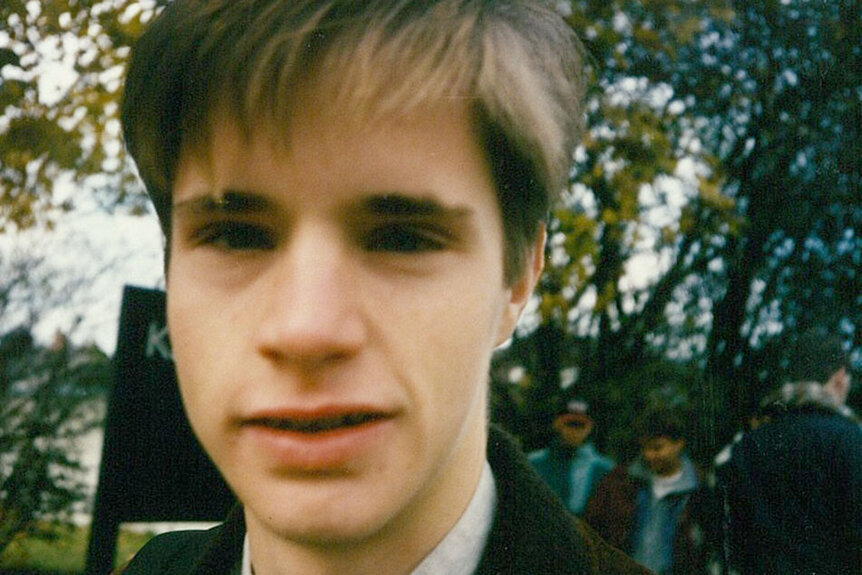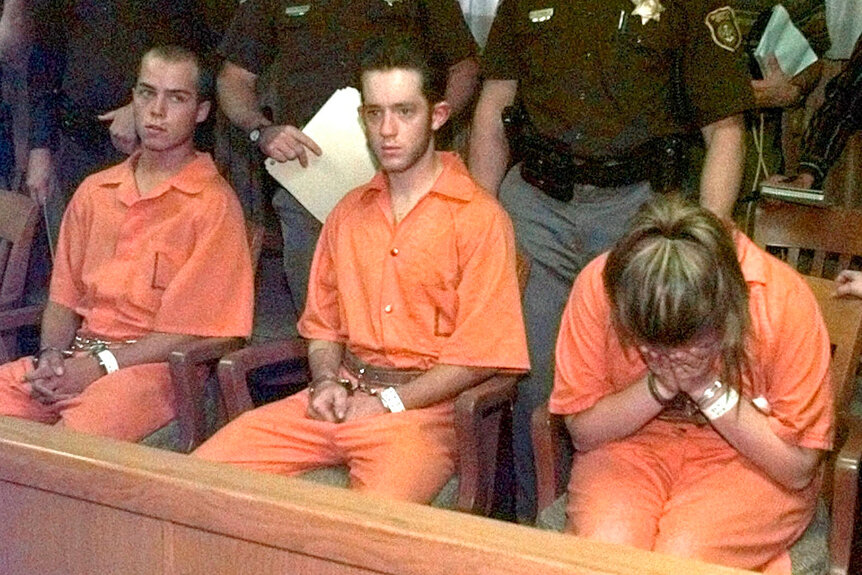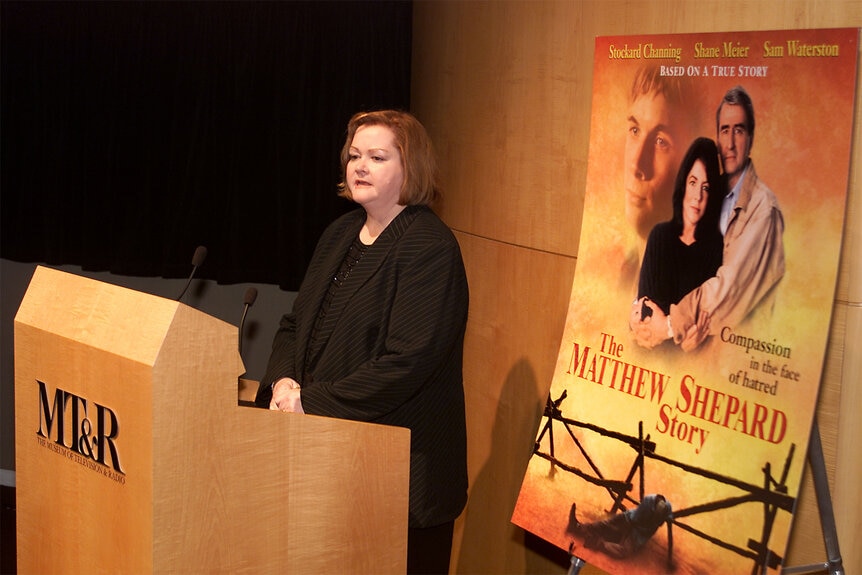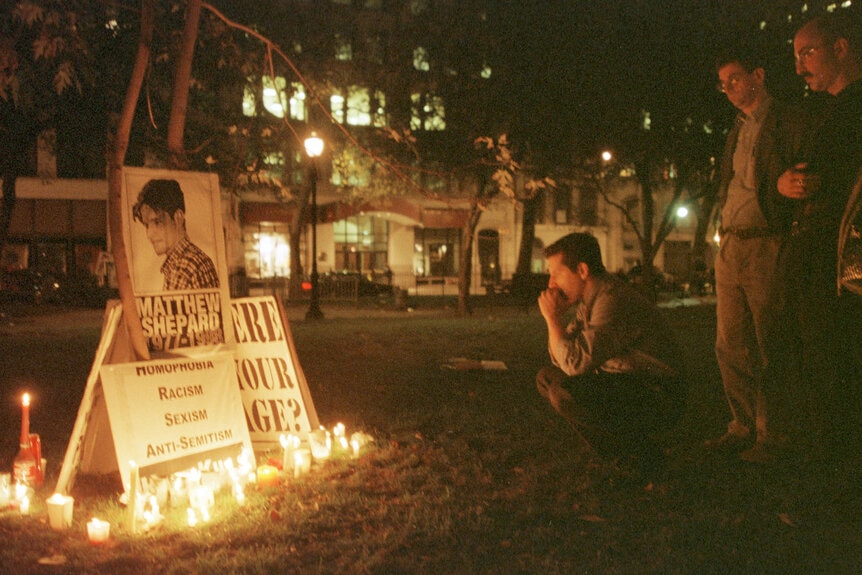Create a free profile to get unlimited access to exclusive videos, breaking news, sweepstakes, and more!
Everything to Know about Matthew Shepard’s Death and the Legacy it Inspired
Matthew Shepard was beaten to death by two Wyoming men in 1998. The hate crime he endured has since inspired new laws and thought-provoking pieces of art.
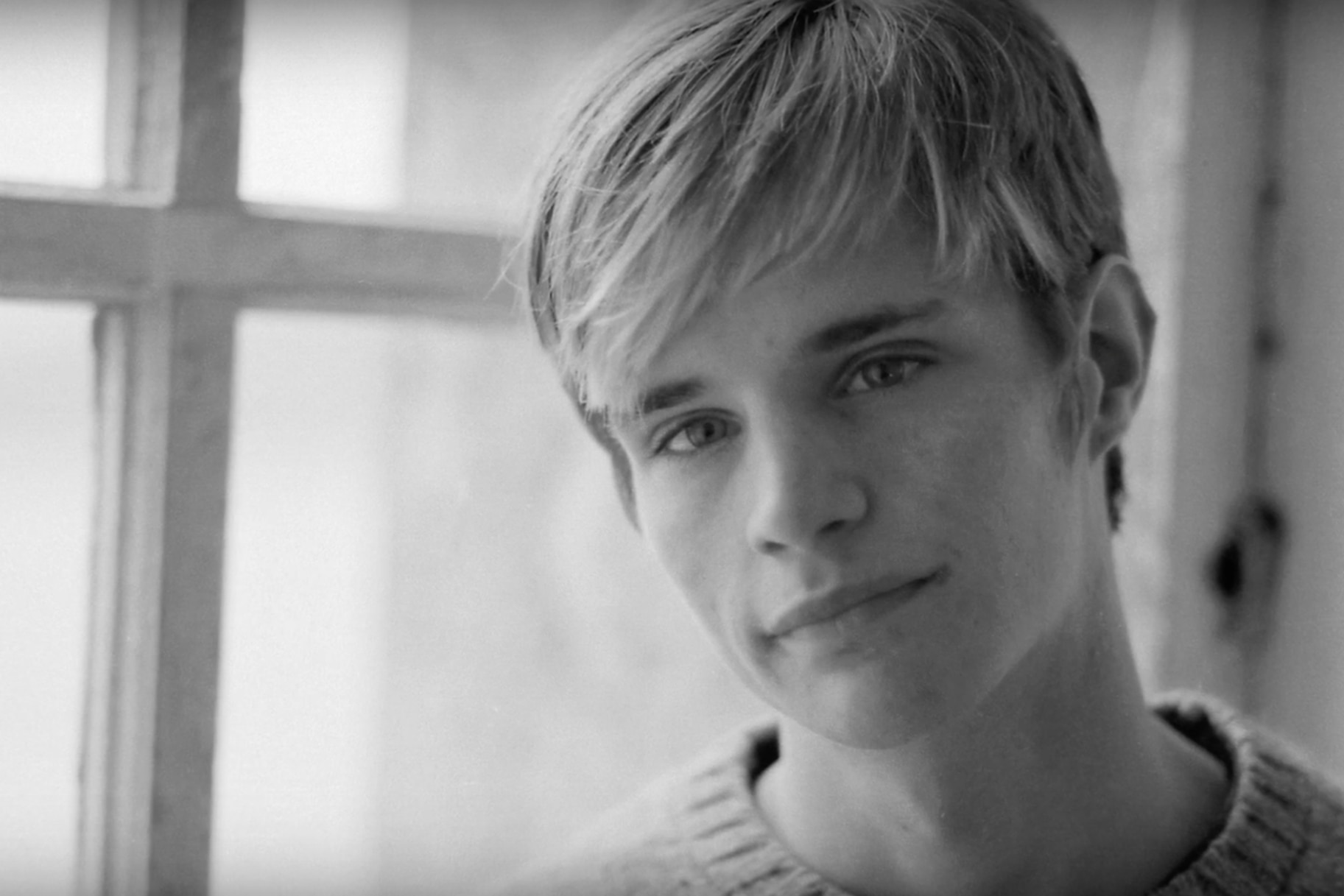
It has been 25 years since the infamous death of gay college student Matthew Shepard, who was beaten, strung up by his hands and left to die in near freezing Wyoming temperatures. His short life and brutal killing evoked a pivotal change for the LGBTQ community, creating legislature and raising awareness about hate crimes in America.
Born on Dec. 1, 1976, Matthew Shepard was the eldest of Judy and Dennis Shepard's children. The family lived in Wyoming for Matthew's childhood before briefly moving abroad, where he was accepted by his peers. "He was easy to talk to, made friends easily, and actively fought for the acceptance of all people," according to the Matthew Shepard Foundation site.
At the time of his death, Shepard was a student at the University of Wyoming, studying political science, foreign relations, and languages.
“He was always caring about other people, very empathetic,” Shepard’s mother Judy Shepard said in Oxygen’s 2019 true crime special Uncovered: Killed by Hate.
RELATED: Have The Most Brutal Hate Crimes Sparked Any Change For The Better?
Judy Shepard said her son came out to her as gay during his freshman year of college, but she always had an inkling about his sexuality.
“I understood that if he was, he actually needed his parents to be there for him,” she said.
“He’s my son. Whatever he wants to do he can do,” Shepard’s father Dennis Shepard told Oxygen about the time Shepard came out to him as gay. “We’re here to encourage him and help him in anyway we can.”
What Happened to Matthew Shepard?
On Oct. 6, 1998, 21-year-old Shepard left a meeting with the LGBTQ student group on campus and headed to the Fireside Lounge, a dive bar local to Laramie, Wyoming, according to BBC. Alone at the bar, Shepard was approached by two men of his age, Russell Henderson and Aaron McKinney.
Police at the time said their main motive to approach the Wyoming student was to rob him, but was apparently chosen because he was gay, per the Associated Press.
In an interview with Greg Pierotti, an actor from the 2009 revival of The Laramie Project, a play inspired by Shepard’s story, McKinney confessed that Shepard’s sexuality played a part in their scheme, as well as “his weakness. His frailty,” per The Denver Post.
Shepard stood roughly five feet two inches tall and had a slight stature. “Matt Shepard needed killing,” McKinney told Pierotti.
Henderson and McKinney posed as gay men to lure Shepard into their truck, The New York Times reported, citing former Carbon County Attorney Calvin Rerucha.
The county attorney’s report said the two men beat Shepard, drove him to an isolated area and pistol-whipped him with a .357 Magnum until he was unrecognizable. Former Laramie Police Commander David O'Malley told the Times that Henderson and McKinney then lashed the University of Wyoming freshman to a prairie fence, stole his wallet and shoes, and left him there to suffer in the brutal cold for 18 hours.
Shepard was found on the evening of October 7 by a passing biker who initially mistook the 21-year-old’s butchered face as that of a scarecrow.
“You’re insulted in your soul at what you see when you first come on something like that,” Albany County Sheriff’s First Responder Reggie Fluty told Investigation Discovery in their new documentary, The Matthew Shepard Story: An American Hate Crime.
Shepard succumbed to his injuries at Poudre Valley Hospital in Fort Collins, Colorado on October 12. His skull was so beaten in that doctors were unable to perform surgery, hospital president Rulon Stacey told the Associated Press in 1998.
“We didn’t understand the kind of hate that Matt faced his entire life,” Shepard’s father told Oxygen. “We didn’t realize the issues, the discrimination, the violence.”
Who Killed Matthew Shepard?
Two days after the night of Shepard’s attack, police arrested Henderson and McKinney. In McKinney’s truck, they found the .357 magnum pistol caked in blood, Shepard’s missing shoes and his credit card, O’Malley previously told the New York Times.
Two separate juries found both Henderson and McKinney guilty of murder in 1999, per the Casper Star-Tribune. The killers remain in prison today.
During a press conference after Shepard’s death was the first time police described the attack as a hate crime, Bob Deck, the former news director of Wyoming Public Radio, told Oxygen. This classification of the crime blasted the young man’s story from a local tragedy to a national outcry.
RELATED: What Happened To Matthew Shepard’s Killers?
“We had no idea why he’d been attacked until we saw a headline on the paper,” Judy Shepard told Oxygen.
“There was the story on the front page of the Minneapolis paper and then the New York Times, and then they say he was murdered because he was gay,” she added. “It was horrifying.”
“For me it was unmistakable that it had to be about hate,” Jason Osborn, Shepard’s friend, told Investigation Discovery.
Matthew Shepard’s Legacy
Shepard’s attack and subsequent death was one of the nation’s most notorious anti-gay hate crimes in its history.
To honor their late son, Judy and Dennis Shepard created the Matthew Shepard Foundation, whose motto is “erasing hate since 1998.”
According to its website, the foundation has “helped pioneer the country’s first federal hate crimes legislation with the passing of the Matthew Shepard and James Byrd, Jr. Hate Crimes Prevention Act in 2009 and provided our unique Hate Crimes Prevention Training to over 1,400 law enforcement officers and prosecutors in 45 cities since May 2017.”
Dennis and Judy Shepard stood next to then-President Barack Obama in 2009, as he signed into law the Shepard Byrd Act, which is the first federal hate crime statute that calls for federal criminal prosecution when committing a crime motivated by the victim’s sexual orientation, gender identity and/or disability, according to the U.S. Department of Justice.
The Laramie Project
Shepard’s story additionally inspired one of the most produced plays of all time. In 1998, New York’s Tectonic Theater Project traveled to Laramie and conducted over 200 interviews with locals. The transcriptions of these interviews were then transformed into The Laramie Project, a play that tells the story of Laramie, Wyoming, a town illuminated by gay-rights activism in the aftermath of Shepard’s death.
According to the Denver Center for the Performing Arts — where The Laramie Project was debuted — the play has been performed in at least 20 countries and in 13 languages. It was even adapted into a film in 2002.
“I think every school should be performing The Laramie Project,” Judy Shepard told the Denver Center, crediting the play for keeping her son’s story alive and heard.
RELATED: Australian Man Accused In 1988 Murder Of Gay American Mathematician Pleads Guilty
While the world continues to digest this twisted piece of LGBTQ history, the community where Shepard’s life was cut short is commemorating him, as the month of October marks the 25th anniversary of his death.
The University of Wyoming is holding their annual “Shepard Symposium on Social Justice” from October 8-14. The symposium features a memorial event for Shepard’s passing, as well as a reading of The Laramie Project with the Tectonic Theater Project.
Although many of the university’s current students were not alive when Shepard was killed, it is a story that still rings through campus.
“I was five years old, living in Florida when I was a kid. And I learned about Matthew Shepard when I moved here for school in 2017,” Dr. Thomas Owen Mazzeti told Wyoming Public Radio. “That’s how I learned about it, just through the Laramie community, just getting involved here.”
“I definitely think they've (attitudes) changed,” University of Wyoming student Jamie told the station. “I don't think that he (Matthew Shepard) could have ever imagined that gay marriage would have been legalized. I think that that is something that has been fantastic. However, on the other side, some things definitely haven't changed.”
